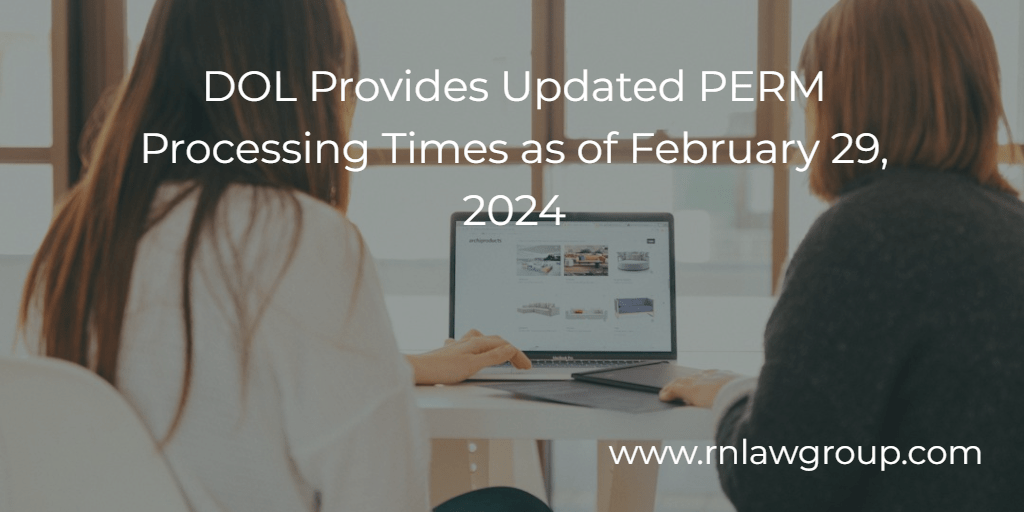
DOL Provides Updated PERM Processing Times as of February 29, 2024
The Department of Labor (DOL) has provided updated processing times for PERM applications (ETA Form 9089) as of February 29, 2024, and for Prevailing Wage Determination (PWD) requests as of January 31, 2024. This data offers valuable insights into the rate of processing for these important stages of the employment-based immigration process. With an understanding of the current processing times, employers and employees can make informed decisions and strategically plan during the employment-based green card process to ensure a timely and successful process.
Prevailing Wage Determinations
The National Prevailing Wage Center (NPWC) is currently adjudicating PWDs filed in September 2023, indicating an estimated processing period of around six months. Further, the DOL is processing PWDs for non-OES wage requests submitted in March 2023, which includes PWDs submitted based on a private wage survey. Furthermore, the NPWC is processing redetermination requests submitted in September 2023.
At Reddy Neumann Brown PC, we have observed PWDs being issued in about 5-6 months.
PERM Applications (ETA Form 9089)
The DOL is currently working on PERM applications filed in February 2023 with an average adjudication time of 401 days. This represents a rise from the processing times reported in January 2024, which stood at 393 days. Also, audits for PERM applications filed in December 2022 are being processed, with an average adjudication time of 505 days. This reflects an increase from the processing times reported in January 2024, which were recorded at 480 days.Top of Form This means that if a PERM application is audited, an additional 3-4 months should be expected for adjudication, for a total of about 16-17 months from the filing date (priority date) of the PERM application. Even further, the DOL is processing reconsideration requests for PERM applications submitted in April 2023.
On March 05, 2024, Reddy Neumann Brown PC received our first PERM approval on behalf of a client for a February 2023 priority date, for a total processing time of 1 year and 25 days. We have since received additional PERM approvals with February 2023 priority dates. However, we still have PERM applications pending with December 2022 and January 2023 priority dates.
Based on information obtained during Reddy Neumann Brown PC’s ongoing PERM delay litigation, the DOL indicated that the agency adjudicates PERM applications by “processing month” and not on a strict first-in/first-out basis. Furthermore, DOL stated,
“PERM applications filed during a ‘processing month’ are not necessarily processed in the order in which they are received by date or time stamp. For example, in order to achieve efficiency and consistency of results, multiple applications filed by a single employer during the processing month may be assigned to one analyst, or group of analysts, and are processed together even though the employer’s PERM applications may have been filed on different calendar days throughout the processing month.”
Therefore, even if your PERM application is filed early in a specific month, there is a chance it could be processed last within that timeframe. Regrettably, there is no definite way to ascertain this. At Reddy Neumann Brown PC we frequently observe such occurrences.
Considering a combination of factors such as DOL’s increased workload, inadequate funding, the introduction of a new filing system/new ETA Form 9089, and a rise in PWD Requests for Further Information, improvement in PERM processing times is unlikely in the near future. Excessive delays in processing PWDs and PERM applications present significant hurdles for employers and foreign workers. Staying updated on processing times is crucial for devising the most effective course of action. Employers should begin the PERM-based green card process as early as possible to avoid issues with an employee’s temporary work visa status and the ability for their employee(s) to continue work in the U.S. Moreover, foreign workers who qualify should explore alternative options such as EB-1A for Extraordinary Ability and the National Interest Waiver. These options do not require a certified PERM or a job offer. Instead, the foreign worker can self-petition. Furthermore, both the EB-1A and NIW based I-140 petitions can be filed in premium processing, allowing for much faster adjudication. This can be a significant benefit for those individuals nearing the H-1B 6 year limit and who are stuck in the green card backlog.
Upcoming Event:
At Reddy Neumann Brown PC, we are dedicated to providing our clients with valuable information. We understand that navigating the complexities of immigration law can be challenging, which is why we prioritize keeping our clients informed every step of the way. Due to interest and inquiries about the PERM-Based Green Card process, especially concerning the impact of long PERM processing times, Reddy Neumann Brown PC Partners Krystal Alanis and Ryan Wilck are hosting a biweekly Zoom Q&A session to address your general related questions. From understanding the PERM process to navigating I-140 and AOS, no question is too small! Our first Q&A session will be held March 14th. To register, click HERE!
Krystal Alanis is a Partner at Reddy Neumann Brown PC with over 10 years of experience practicing U.S. business immigration law. Krystal manages the firm’s PERM Labor Certification Department, where she oversees all EB-2 and EB-3 employment-based green card matters. Krystal guides clients from a variety of industries through the maze of the PERM Labor certification process and has handled thousands of PERM applications throughout her career. Krystal guides employers through the I-140 and Adjustment of Status process, and assists clients with temporary work visas. Further, she oversees the firm’s I-9 compliance team where she advises employers regarding Form I-9 Employment Eligibility Verification requirements and conducts internal audits of a company’s I-9 records, processes, and procedures. Additionally, Krystal represents clients in Form I-9 U.S. Immigration and Customs Enforcement (ICE) inspections (Notice of Inspection). Krystal successfully settled a claim with ICE over Form I-9 substantive paperwork violations that led to an 88% reduction in civil fines for her client.


